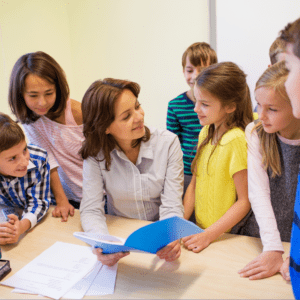There are many reasons why you would want to send your child to boarding school. Many parents choose boarding schools because they offer a more challenging academic environment than public schools in their local area; if you are happy to send your child to a boarding school, you have a much wider variety of options.
Some will choose boarding schools because of the quality of the extracurricular activities or arts programs available, and some will choose boarding schools because of the discipline and structure that is often found in these schools. Others will even send their child to boarding school because boarding schools can provide a level of social and emotional support that is often not available in other types of schools.
Academic benefits
Boarding schools can offer a more challenging and rigorous academic environment than many public schools. While every school is of course different, and there are some fantastic public schools as well as some awful boarding schools, because of the increased parent buy-in, you can expect to get value for your money from a private boarding school.

In addition, boarding school teachers are typically more experienced. Boarding schools with more money coming in can afford to pay their teachers more. This in turn means that there is higher competition for jobs, so the school has a broader pool of candidates for teaching positions and they can pick and choose the very best.
Boarding schools also often have a lower student-to-teacher ratio than public schools. Again, this is linked strongly to the amount of funding that the school can get by being privately funded through school fees. The fact that a school is a boarding school also means that students are able to access extra support outside of the typical school day, and their teachers have more time to get to know each of their students as individuals.
Because your child will be staying at the boarding school for much longer periods of time, it is also much more likely that any academic problems will be picked up more quickly. At a boarding school, students have much fewer ways that they can hide if they are not doing their homework or are stuck on an assignment. Teachers are more likely to recognise these problems before they become real problems so they can help their students more quickly and efficiently.
Social benefits
Boarding school can provide an opportunity for your child to meet other students from different backgrounds and cultures. Many boarding schools attract students from all over the world because it is easier for a student to move internationally to attend a boarding school than having to find a host family or alternative accommodation.
Interacting so closely with other students from a wide range of different contexts and backgrounds is excellent for the development of social skills, empathy, and cultural awareness.1 These are skills that are essential for young people to develop in our increasingly globalised world. While day students at these schools will also benefit from being a part of a multicultural school, boarders have the additional benefits of the strong social connections that are forged through going through boarding school together.

Students who attend boarding schools are also forced to develop their independence and self-reliance. In a boarding school, you need to become focused on your own schedule, routine and well-being and a part of this is regulating your own social interactions and needs. At boarding school, you don’t have your parents there to help gauge and reflect on which people are worth having around, and which are bad influences.
There is also the fact that at boarding school, you are forced to be around the same group of people for much longer periods of time. Learning to get along with just about anybody is a great skill to have and will go incredibly far in a future work environment, and boarding schools are the perfect place to develop these skills.
Emotional benefits
Boarding school can provide a sense of stability and structure for children who need it. Boarding school is a place where routine and structure are strictly enforced, but this also builds each student’s understanding of the importance of these routines that they will carry on for the rest of their lives.
Routines are incredibly important for feelings of safety and allow young people to feel more confident and able to take risks in their learning2; by reducing the unexpected in their lives, they can choose where they want to take risks into unpredictable outcomes. This is as true for adults in their working lives as it is for high school students.
Spiritual benefits
Boarding school can offer an opportunity for your child to explore their spirituality in a safe and supportive environment. This could be because your child is attending a specific boarding school that’s associated with their religion, or it could be about a more agnostic sense of spirituality.
It is rare to find a boarding school without a huge focus on its particular school values. If you choose a school that is aligned with values that you and your child strongly believe in, attending this school can be a great opportunity for your child to strengthen their sense of these values and see them more in themselves. It will also place them into an environment with other students and families who share the same values.
In addition, boarding school can provide a sense of community and belonging for students who are seeking it. Community connectedness and a strong sense of belonging is directly linked to well-being3, and the structure of boarding schools supports a strong sense of belonging between students as well as their families. These connections often last long after finishing school, with many of these boarding schools having very active old scholars groups and associations.
Choosing the right boarding school is essential.
Whatever your reason is for considering a boarding school, different specific schools will have different strengths and weaknesses, which is why it’s very important that you do your research. Because each school is so unique, it is important that you don’t just send your child to ‘any’ boarding school, but that you choose the right option for them.
When children are away at boarding school, they could be living in a supportive community of their peers and adults, or they could be in a situation where they cannot avoid the stressors of their school lives and disconnect. The community aspects of boarding schools can provide the stability and structure that some children need in order to thrive, as well as the opportunity for children to form strong, lasting bonds with their peers.
Are you considering a boarding school for your child? Did you go to boarding school yourself? Share your experiences in the comments below!
References:
1Nieto, S. (1992). Affirming diversity: The sociopolitical context of multicultural education. Longman, 10 Bank Street, White Plains, NY 10606..
2Barton, A. W., Brody, G. H., Yu, T., Kogan, S. M., Chen, E., & Ehrlich, K. B. (2019). The profundity of the everyday: Family routines in adolescence predict development in young adulthood. Journal of adolescent health, 64(3), 340-346.
3Roffey, S. (2013). Inclusive and exclusive belonging: The impact on individual and community wellbeing. Educational and Child Psychology, 30(1), 38-49.






It was great to learn more about the social benefits of boarding schools, like the development of empathy and cultural awareness. My parents want my younger brother to not just succeed in school, but also develop reliable social skills. I’ll share this article with them so they can start looking for a great boarding school for my brother to attend.
Thank you, I’m glad I could help!